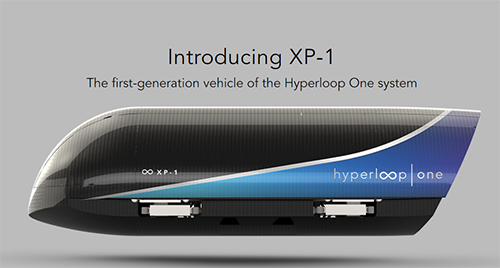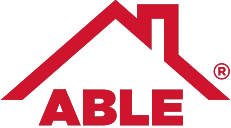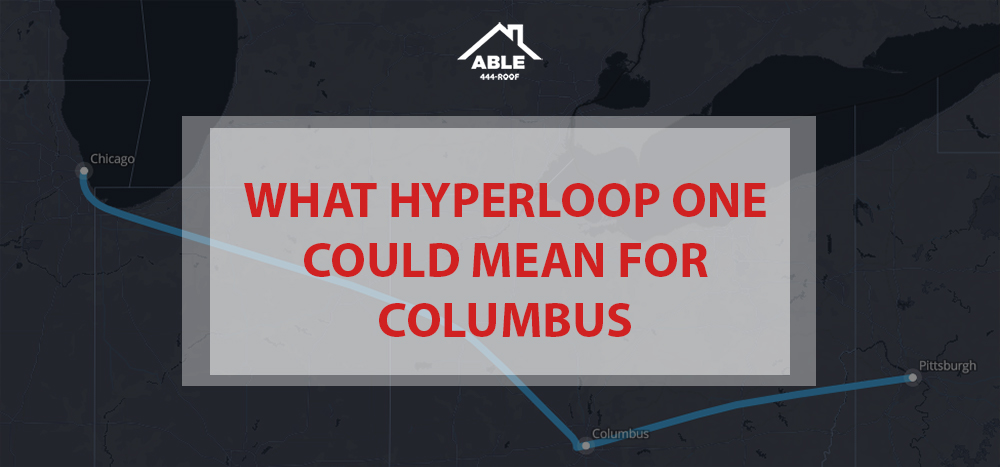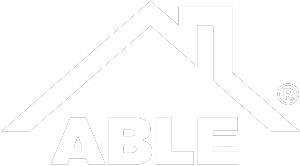The average drive from Columbus to Chicago takes close to six hours on a good day. New travel technology just on the horizon could change all that. Theoretically, Hyperloop One could shorten the half-day trip to a breezy 30 minutes. Columbus just earned a spot on the list of international finalists as one of the most impactful areas for installation.
How Hyperloop Technology Works
Hyperloop One combines the convenience of ground travel with faster-than-airplane speeds. The technology relies on a magnetic levitation in a low-pressure environment creating an air cushion surrounding passenger and cargo pods in a tube. Each pod will feature an electric motor to propel it within this air-hockey-table-like environment at speeds of up to 760 mph.
 Sourced from hyperloop-one.comThe company, Hyperloop One, is working on plans to build the transit systems both above ground on pylons and below ground in tunnels, depending on the area. The technology will likely represent the first fully autonomous passenger transportation system in the world. In practice, the technology should prove more cost effective, safe, and environmentally friendly than all other modes of transportation.
Sourced from hyperloop-one.comThe company, Hyperloop One, is working on plans to build the transit systems both above ground on pylons and below ground in tunnels, depending on the area. The technology will likely represent the first fully autonomous passenger transportation system in the world. In practice, the technology should prove more cost effective, safe, and environmentally friendly than all other modes of transportation.
In a mock-up of how the system would work in Dubai, Hyperloop One revealed that passengers would use an app to identify Hyperloop pod availability. Since a hyperloop system may include hundreds of different gates with available pods, the app would provide riders with gate information and directions. In this particular scenario, the system could support more than 8,500 passengers every hour.
The Latest on Hyperloop One
While the announcement for Columbus is exciting, the technology is still a few years away from its first installation. Hyperloop One plans to install three real-world, working systems by 2021.
In May 2017, Hyperloop One tested its system at scale in its “DevLoop” in Apex, Nevada. The first full-scale test only lasted 5.3 seconds, but it provided valuable feedback for the development team. In July, the company watched its pods travel at three times the speed and 4.5 times the distance of its initial run. Each test brings the vision of futuristic travel closer to reality.
How Columbus Made the List
In May 2016, Hyperloop One called on cities around the world to develop proposals on why their regions would make the strongest hyperloop routes. In total, 2,600 teams registered for the challenge, and over 100 submitted proposals. The company relied on a team of experts to narrow the field down to 10 finalists from the US, UK, Mexico, India, and Canada.
Columbus is part of a proposed Chicago-Columbus-Pittsburgh route. If created according to projected models, the new route would allow people to travel from Chicago to Pittsburgh in 47 minutes, from Chicago to Columbus in 29 minutes, and from Columbus to Pittsburgh in just 18 minutes.
To earn its spot as a finalist, our team highlighted the current lack of freight and passenger rail trains connecting the three cities. The line would support existing public-private partnerships, expand employment opportunities, maximize the region’s economic potential, and exponentially reduce travel times for certain professionals. This Midwest “megaregion” features close to 200 universities, numerous headquarters and corporate offices, and 15 pro sports teams.
What Hyperloop One Would Mean for Residents in Columbus
For residents in Columbus, Dublin, New Albany, and other suburbs, the installation of a hyperloop system could have a massive impact on quality of life. According to the proposal, 55% of US residents live within a day’s drive of the proposed loop. The loop could facilitate 1.9 million passenger trips per year. Sourced from hyperloop-one.com
Sourced from hyperloop-one.com
Many professionals in Columbus routinely travel to Chicago for business. Some rent rooms or apartments during the week and travel home on the weekends to see their families – it’s a tough reality. The presence of a working hyperloop would allow these workers from many different industries to easily make a daily commute from Columbus to Chicago. Considering that the average commute time within Chicago alone is 34 minutes, residents would save countless hours traveling between Columbus and Chicago and within the metro-Chicago area.
Faster freight transportation times could impact cost of living in a positive way; and locals could expand their job searches for better career opportunities. Recreationally, it would open the doors for locals to take a day trip into Chicago and Pittsburgh. They could catch a ballgame in three major cities, easily reach most retail stores, and take weekend trips from either destination without traveling for days at a time. Students could tour some of the most popular schools in the country without taking a week long road trip.
A working hyperloop system could be the new reality for Columbus residents in 5-10 years. Whether Hyperloop One ultimately meets its max speed goal of 760 mph or not, the potential for a high-speed transportation system holds promise for local residents, businesses, and the Midwest.
Here at Able Roof we are proud to boast the title of the number one, local roofer for Central Ohio. We have been providing premium quality roofing and exterior repairs for over 30 years, and we boast over 250,000 satisfied customers. If you live in Columbus, OH, and you are looking for a reliable roofer, you have come to the right place. Call today to set up a free estimate!








